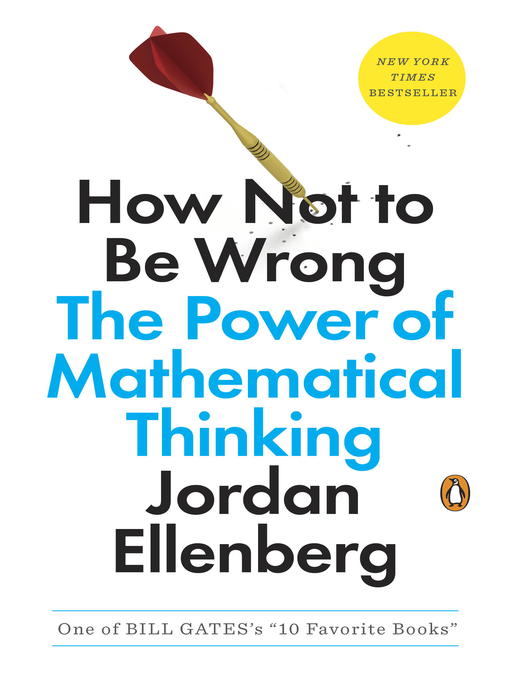
How Not to Be Wrong
The Power of Mathematical Thinking
کتاب های مرتبط
- اطلاعات
- نقد و بررسی
- دیدگاه کاربران
نقد و بررسی

Starred review from April 21, 2014
In this wry, accessible, and entertaining exploration of everyday math, Ellenberg, professor of mathematics at the University of Wisconsin, Madison, shows readers how “knowing mathematics is like wearing a pair of X-ray specs” that reveal the hidden structure of the world. Too often, mathematics is taught as a “long list of rules” without any real-world application. Ellenberg stresses that even the most complex math is based on common sense and then proves it with examples that take the abstract and make it real. Lines and curves provide the foundation for explorations of the Affordable Care Act and the infamous Laffer curve (with a Ferris Bueller shout-out). The ancient and “extremely weird” Pythagoreans help us calculate the area of a tuna fish sandwich. The search for patterns in large, seemingly random data leads to a fascinating discussions of lotteries and of why “reading” sheep entrails isn’t a good way to predict stock prices. From discussing the difference between correlation and causation, to how companies use big data to predict your interests and preferences, Ellenberg finds the common-sense math at work in the everyday world, and his vivid examples and clear descriptions show how “math is woven into the way we reason.” Agent: Jay Mandel, William Morris Endeavor.

May 1, 2014
It's time to drop the idea that mathematics is an esoteric field best left to a few academics. In fact, writes Ellenberg (Mathematics/Univ. of Wisconsin), the truth is better: Math is everywhere, and the knowledge it yields can benefit everyone.The structure of the world around us-everything from the genetics that determine height to intricacies of electoral politics-is infused with the principles of mathematics. Ellenberg, author of the "Do the Math" column at Slate, argues that math is not relegated to the set of hard and fast rules taught in classrooms. Instead, the field is an extension of common sense that has the potential for sophisticated and deeply insightful applications that produce better results than common sense alone. The author avoids heavy jargon and relies on real-world anecdotes and basic equations and illustrations to communicate how even simple math is a powerful tool. In addition to grand applications like those used in calculus or physics, mathematical principles can be wielded pragmatically to improve decision-making and better parse splashy claims made about the stock market or lottery-or, more humorously, claims that hidden codes embedded in the Bible can predict the future. Importantly, Ellenberg insists that improbable things happen all the time, and they can't be taken at face value; there is frequently more information available that will improve a calculation's result and eliminate statistical anomalies, however tempting those are to believe. The author writes that, at its core, math is a special thing and produces a feeling of understanding unattainable elsewhere: "You feel you've reached into the universe's guts and put your hand on the wire." Math is profound, and profoundly awesome, so we should use it well-or risk being wrong.Witty and expansive, Ellenberg's math will leave readers informed, intrigued and armed with plenty of impressive conversation starters.
COPYRIGHT(2014) Kirkus Reviews, ALL RIGHTS RESERVED.

Starred review from May 1, 2014
How many home runs can fans expect a league leader to hit after the All Star break? Why is the most handsome man around often the rudest? By exploring questions such as these, Ellenberg breaks through the widespread perception of mathematics as a narrowly academic pursuit, hopelessly irrelevant to the lives of ordinary people. Readers will indeed marvel at how often mathematics sheds unexpected light on economics (assessing the performance of investment advisors), public health (predicting the likely prevalence of obesity in 30 years), and politics (explaining why wealthy individuals vote Republican but affluent states go for Democrats). Relying on remarkably few technical formulas, Ellenberg writes with humor and verve as he repeatedly demonstrates that mathematics simply extends common sense. He manages to translate even the work of theoretical pioneers such as Cantor and Gdel into the language of intelligent amateurs. The surprises that await readers include not only a discovery of the astonishing versatility of mathematical thinking but also a realization of its very real limits. Mathematics, as it turns out, simply cannot resolve the real-world ambiguities surrounding the Bush-Gore cliff-hanger of 2000, nor can it resolve the much larger question of God's existence. A bracing encounter with mathematics that matters.(Reprinted with permission of Booklist, copyright 2014, American Library Association.)

























دیدگاه کاربران